Book contents
- Frontmatter
- Dedication
- Contents
- Working Group
- About the authors
- Acknowledgements
- Abbreviations
- Section 1 Introduction
- 1 Introduction
- 2 Saving mothers' lives: lessons from the Confidential Enquiries
- 3 Structured approach to emergencies in the obstetric patient
- Section 2 Recognition
- Section 3 Resuscitation
- Section 4 Trauma
- Section 5 Other medical and surgical emergencies
- Section 6 Obstetric emergencies
- Section 7 Triage and transfer
- Section 8 Human issues
- Index
2 - Saving mothers' lives: lessons from the Confidential Enquiries
- Frontmatter
- Dedication
- Contents
- Working Group
- About the authors
- Acknowledgements
- Abbreviations
- Section 1 Introduction
- 1 Introduction
- 2 Saving mothers' lives: lessons from the Confidential Enquiries
- 3 Structured approach to emergencies in the obstetric patient
- Section 2 Recognition
- Section 3 Resuscitation
- Section 4 Trauma
- Section 5 Other medical and surgical emergencies
- Section 6 Obstetric emergencies
- Section 7 Triage and transfer
- Section 8 Human issues
- Index
Summary
Introduction
Much of the wisdom in this book has been learned the hard way, some of it in the hardest way of all. When a woman dies as a result of an obstetric complication, the only good thing that can come out of the tragedy is that appropriate lessons are learned. For over 50 years, England and Wales have had a system in place to analyse all maternal deaths, identify the causes and highlight avoidable factors.
The Confidential Enquiries into Maternal Deaths (CEMD) have become so familiar to UK obstetricians and midwives that we can hardly imagine life without them. The UK, however, is one of only a few countries with a national system in which experienced clinicians scrutinise cases in detail to work out whether death could be prevented when a similar emergency happens again and, if so, how.
CEMD recommendations carry considerable weight at both political and clinical levels. This chapter will describe the system that produces these recommendations and will then focus on lessons relevant to emergencies and trauma – including those learned in the early years of the Enquiry, which are all too easily forgotten.
- Type
- Chapter
- Information
- Managing Obstetric Emergencies and TraumaThe MOET Course Manual, pp. 7 - 16Publisher: Cambridge University PressPrint publication year: 2014

